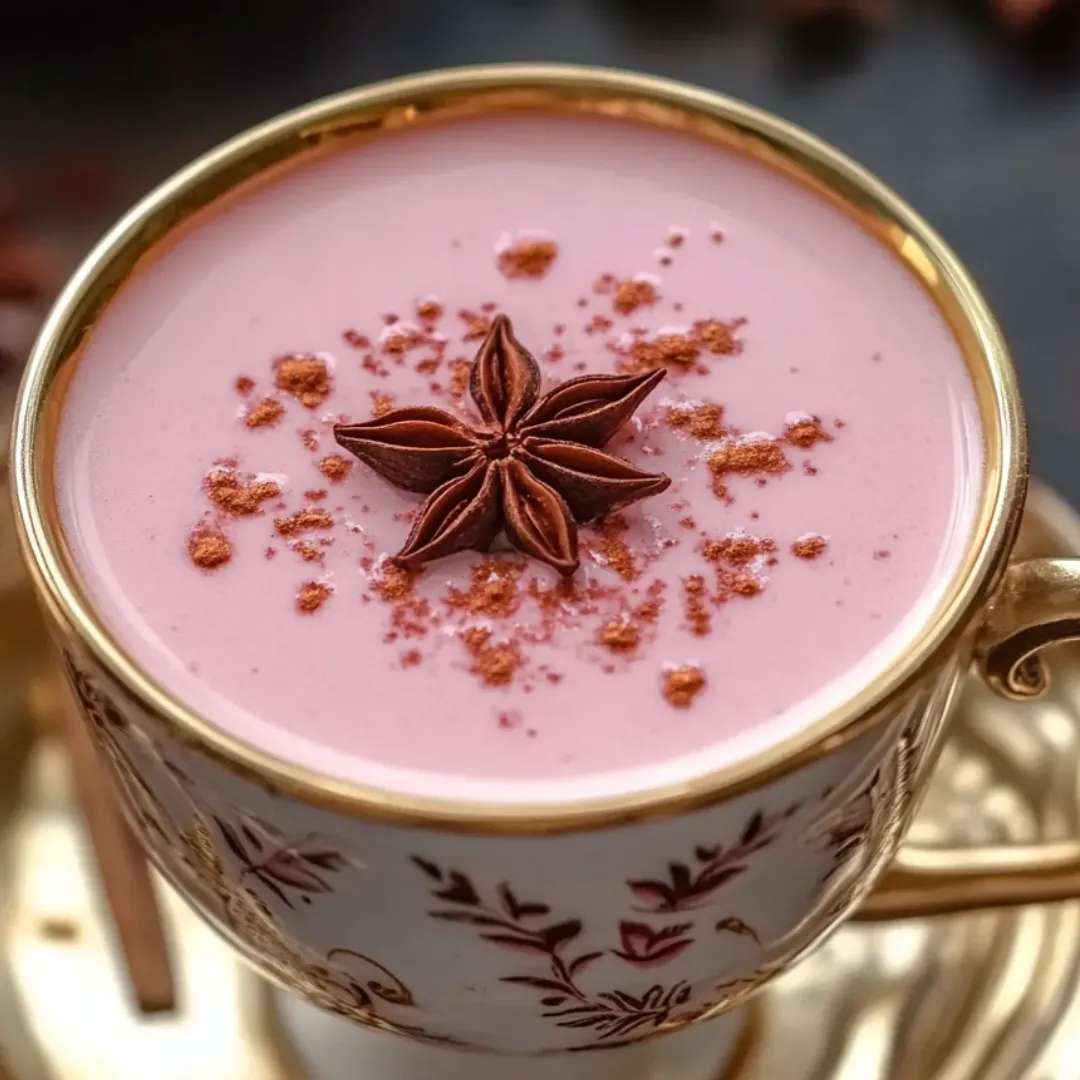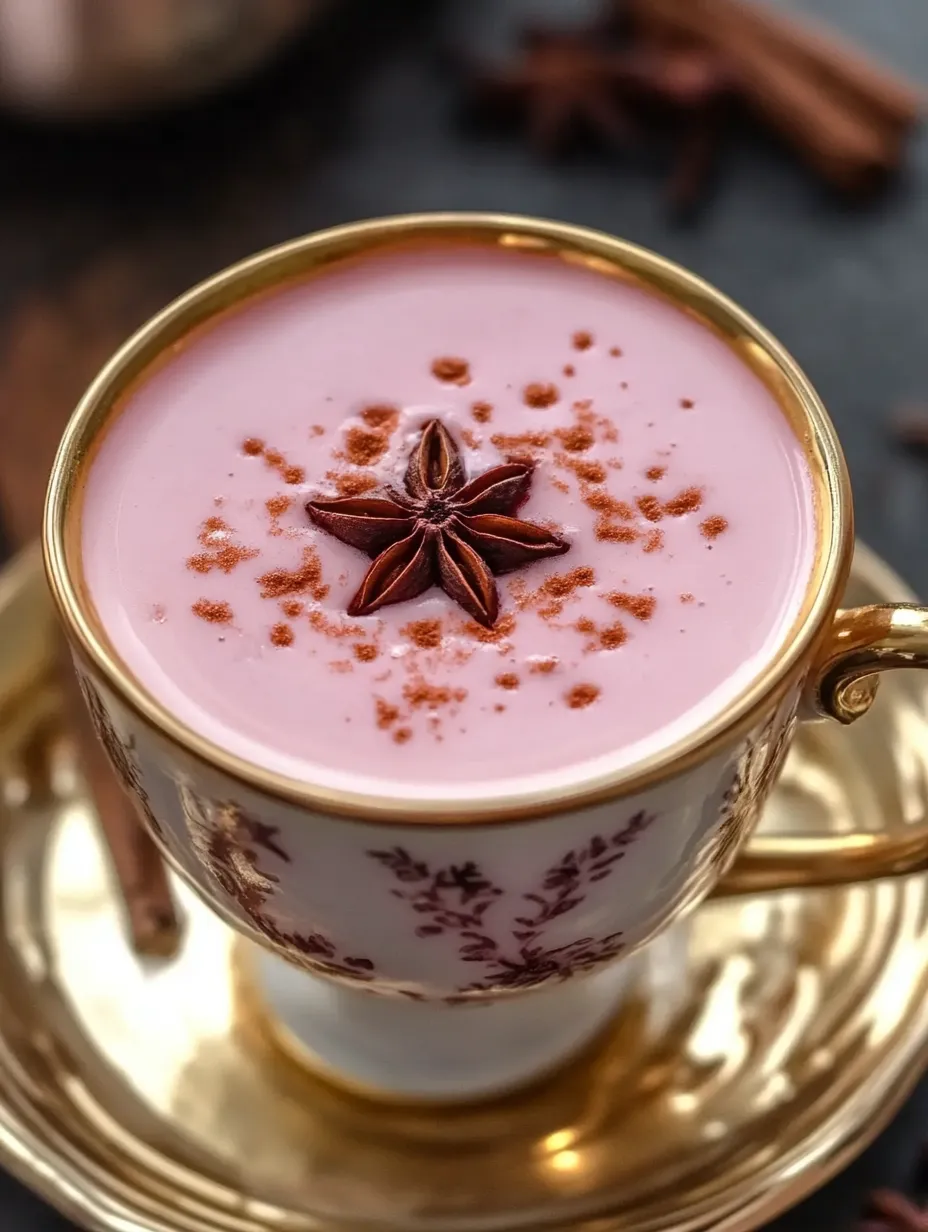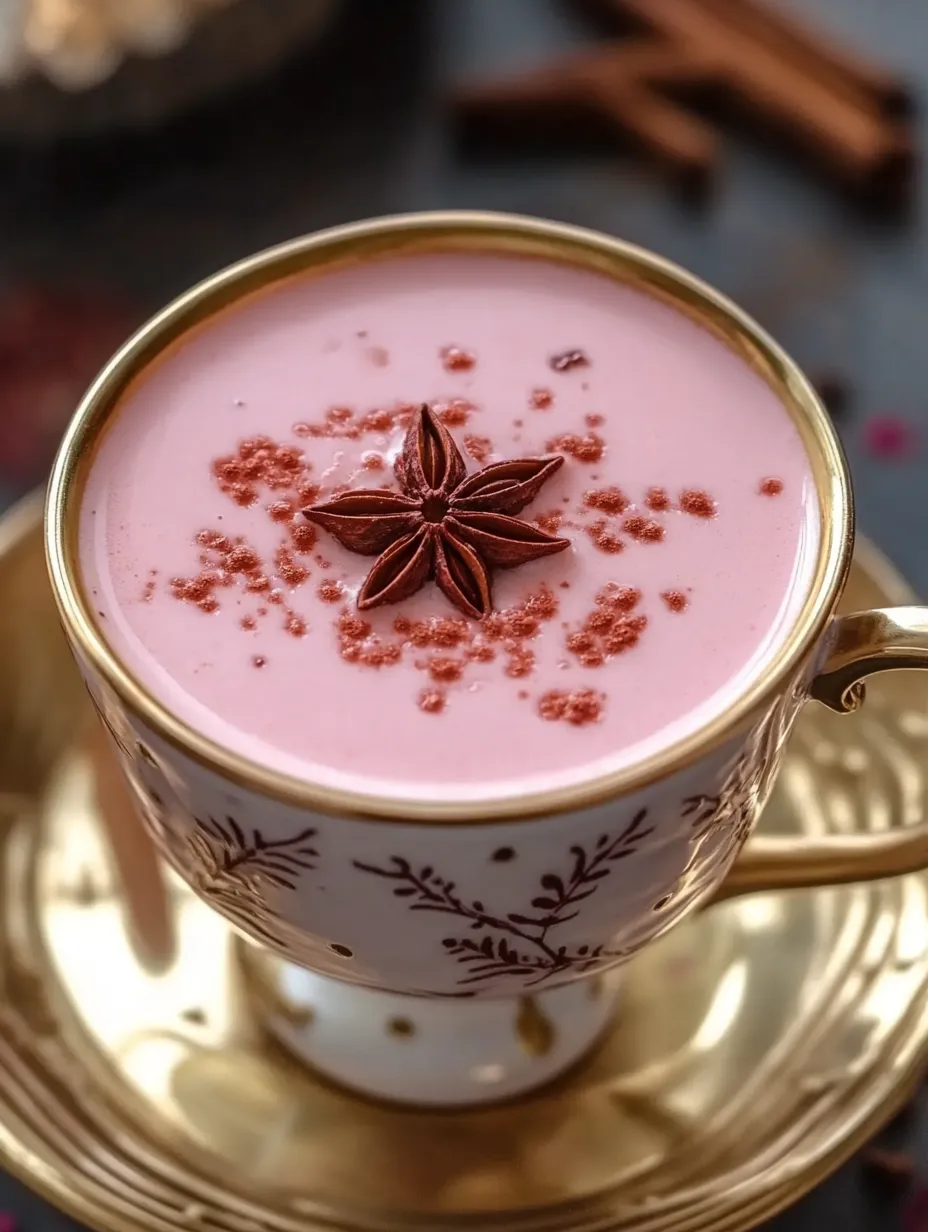 Pin it
Pin it
This enchanting Kashmiri Pink Chai, also known as Noon Tea, transforms an ordinary tea moment into a magical ritual. The remarkable color-changing process creates a beautiful pink beverage that tastes as extraordinary as it looks—creamy, aromatic, and unlike any tea you've experienced before.
I first encountered this tea during a cold winter visit to northern India, and the memory of that first sip has stayed with me for years. The way the locals prepared it with such care and tradition inspired me to master the process myself.
Ingredients
- 4 cups Water: the foundation of any good tea
- 2 tbsp Kashmiri/Himalayan green tea leaves: specifically grown for this preparation with a unique ability to change color
- 1/2 tsp Baking soda: the magical ingredient that triggers the color transformation
- 1-2 Star anise: adds a subtle licorice note that complements the other spices beautifully
- 2 Cardamom pods: crushed to release their aromatic oils and distinctive flavor
- 1 Cinnamon stick: provides warmth and sweetness that balances the tea's strength
- 1/4 tsp Salt: traditional addition that enhances all the flavors
- 2 cups Whole milk: creates the creamy texture and helps develop the signature pink color
- Sugar or honey: to taste adjust according to your preference for sweetness
- Crushed nuts for garnish: adds texture and visual appeal to the finished drink
Step-by-Step Instructions
- Prepare the Base:
- Bring four cups of water to a vigorous boil in a deep saucepan. Add the Kashmiri green tea leaves and continue boiling for a full 5 minutes to extract the tannins and flavor compounds. This extended boiling is essential for the distinctive taste and color development.
- Create the Color Transformation:
- Add the baking soda and watch as the chemistry happens before your eyes. The liquid will transform to a deep burgundy red color. This reaction between the tea compounds and the alkaline baking soda is what ultimately allows the pink color to develop. Boil for 2 more minutes to complete this reaction.
- Add Aromatics:
- Introduce the star anise, crushed cardamom pods, and cinnamon stick to the mixture. Let them boil together for just a minute to begin infusing their flavors without overwhelming the tea base.
- Reduce and Intensify:
- Lower the heat to achieve a gentle simmer and allow the mixture to reduce slowly for 20-30 minutes until it reaches approximately half the original volume. This concentration intensifies both the flavor and color. The liquid will become quite dark and robust.
- Season with Salt:
- Add the salt and stir thoroughly to dissolve. This might seem unusual for a tea, but salt is traditional in Kashmiri chai and works to enhance the complex flavors of the spices and tea.
- Add Milk and Create Pink Magic:
- Pour in the whole milk and increase the heat to bring the mixture back to a boil. Stir constantly to prevent the milk from scalding or forming a skin. As the milk combines with the tea and heats up, the real transformation happens the liquid gradually shifts to its signature pink color.
- Strain and Serve:
- Once you achieve that beautiful pink hue, remove from heat and strain the chai through a fine mesh sieve to remove all tea leaves and spice solids. Pour into traditional tea cups or glasses.
- Sweeten and Garnish:
- Add sugar or honey according to your taste preference and top with crushed nuts like pistachios or almonds for an authentic touch. The nuts provide a pleasing textural contrast to the smooth tea.
 Pin it
Pin it
My grandmother taught me to respect the slow process of making this chai. She would say that patience while waiting for the color to develop was like watching a flower bloom you cannot rush nature's beauty. This perspective has influenced how I approach many traditional recipes.
The History Behind the Pink
Kashmiri Pink Chai has deep cultural roots in the Kashmir Valley, where it is traditionally served at weddings and special celebrations. The pink color symbolizes joy and festivity, while the salt component reflects the region's Himalayan salt influences. Historically, this tea was served to honored guests and remains a symbol of hospitality in Kashmiri homes. The technique of preparing this tea has been passed down through generations, with each family often having their own slight variation on the recipe.
Storage and Reheating
Kashmiri Pink Chai can be stored in the refrigerator for up to 2 days in an airtight container. The color may deepen slightly during storage, which is completely normal. When reheating, do so gently on the stovetop rather than in a microwave to maintain the smooth texture. Add a splash of fresh milk if the chai seems too concentrated after storage. For best flavor experience, I recommend making just enough to enjoy fresh, as the aromatic qualities are most vibrant immediately after preparation.
Authentic Variations
In different regions of Kashmir, you'll find slight variations on this basic recipe. Some families add a pinch of crushed pistachios directly into the tea while brewing. Others might include a tiny amount of dried rose petals for an additional floral note. In more modern interpretations, a drop of beetroot juice is sometimes added to enhance the pink color, though purists consider this unnecessary when the traditional method is followed correctly. The strength of the tea also varies by preference some Kashmiri families brew an intensely strong version that is then diluted with additional hot milk at serving time.
 Pin it
Pin it
Serving Traditions
In Kashmir, this pink chai is traditionally served in small, handleless cups called koshur kehwah. The tea is often accompanied by traditional Kashmiri breads like lavasa or tsot. For an authentic experience, serve your chai alongside dried fruits and nuts such as dates, figs, almonds, and pistachios on a shared platter. In formal settings, the tea might be served from a samovar, a special metal container with a spigot that keeps the tea warm. The best time to enjoy Pink Chai is during afternoon gatherings or during cold weather when its warming properties are most appreciated.
Frequently Asked Questions
- → What makes Kashmiri Pink Chai pink?
The pink color comes from the reaction between the green tea and baking soda during boiling, which intensifies when milk is added.
- → Can I use regular green tea for Kashmiri Pink Chai?
While traditional Kashmiri or Himalayan green tea is ideal, you can use regular green tea, though the flavor may differ slightly.
- → How sweet should the tea be?
The sweetness is customizable; you can use sugar or honey according to your taste preferences.
- → What spices are used in Kashmiri Pink Chai?
Common spices include star anise, cardamom pods, cinnamon sticks, and sometimes crushed nuts as garnish.
- → Can I make this tea in advance?
You can prepare the tea base in advance and add milk and sweetener before reheating to serve.
